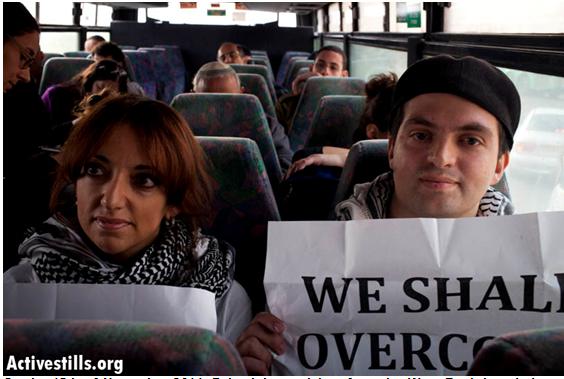As of December 2014, it is unlawful for Palestinian workers to use Israeli bus lines, which travel across the occupied West Bank to the settlement of Ariel. Instead, they have to stop at the Eyal checkpoint, miles away from their homes, and then continue on segregated bus lines to their jobs. In their return journey they have to commute from the checkpoint to their homes on their own.
In November 2014, the Israeli Ministry of Transportation introduced separate bus lines for Palestinians. Afikim, the Israeli company operating these bus lines, has been conducting an official policy of segregation, and facilitating, and promoting its enforcement on Palestinian land. Last month, Moshe Ya’alon, the Israeli Minister of Defense, officially decided to prohibit Palestinians from using Israeli public transportation on their way back to their homes in the West Bank. Instead, Palestinian workers are now dropped off at the Eyal checkpoint, from where they are prevented from boarding Israeli buses that serve the West Bank. Generally speaking, bus companies such as Super Bus, Egged, Dan Public Transportation, and Veolia have been directly profiting from the occupation by providing their services to settlements.

On November 15, 2011, Palestinian activists from the West Bank boarded an Israeli bus to Jerusalem in an attempt to highlight the regime of discrimination on freedom of movement in the Occupied Territories. After boarding without incident, the bus was stopped at the Hizme checkpoint, where all the activists were arrested and forcibly removed. (Photo: Activestills)
Afikim
The transport company Afikim provides public transportation services to Israeli settlements in the West Bank. In 2009, the company purchased all bus lines previously operated by Dan Public Transportation which travel daily to and from the settlements of Ariel, Ma’ale Adumim, Karnei Shomron, and the Barkan industrial zone. For the past 3 years, Afikim has been conducting an official policy of ethno-national segregation, and has recently taken steps to further its implementation.
Afikim’s bus line numbered 86, initially established to serve settlers by connecting the settlement of Ariel to the Israeli city of Petach Tikva, was also used by Palestinian workers commuting to their jobs in the Tel-Aviv area inside the green line. However, in response to a campaign calling for ethno-national segregation launched by the Committee of Shomron Settlers, the company created a new lower-fee line exclusively for Palestinian workers, luring them into their policy of segregation. In March 2014, more such lines were officially established connecting the surrounding settlements around Qalqilya in the West Bank to Tel-Aviv and Petach Tikva.
Afikim’s CEO, Ben Hor Ahvat, confirms and even justifies this policy. In a public statement made in 2013, he said that “The Palestinians make their lives easy when they travel with us via the Cross Samaria Highway, which is meant for Israelis only.” To this he added “every driver has the authority to decide that a Palestinian is suspicious and to call the police.” Afikim’s head also explained the legal system applied in the Occupied Palestinian Territories, which enables the company to practice this policy: “Within Judea and Samaria, the situation is different [from that maintained in Israel] as Palestinians are prohibited from entering Israeli communities without a permit from the security officer and an armed person accompanying them.”
Other Companies
Egged, an Israeli transportation cooperative, operates special bus lines to almost every Israeli settlements in the West Bank, including remote outposts. The company owns a fleet of 45 armored buses, specifically designed and manufactured by Merkavim, serving settlements in the regional councils of Shomron, Gush Etzion, Mateh Binyaimn, and Har Hebron.
In 2014, Egged purchased 152 buses that had passed European vehicle assessments (Euro 6 standards of emissions). These new buses include the following: 97 Mercedes OC500 intercity buses, 15 Man NG363 buses, and 40 Scania buses. In July 2014, Egged launched six new lines serving Israeli settlements in the West Bank. Two of the new lines operate from the settlement of Neveh Daniel in Samaria, cross the green line to reach the city of Beit Shemesh inside Israel, and from there head south, back into the West Bank, to the settlement of Kfar Etzion. The third line runs from Jerusalem to the settlement of Nokdim in Gush Etzion. In addition, Egged launched two new night lines which run between Jerusalem and the settlements of Ofra and Kfar Etzion. Yet another new line runs between Tel Aviv and Modi’in, passing through several Samaria settlements en route.
In addition to providing its services to settlements, Egged employs Palestinian drivers who are forced to work in non-secure environments. In November 2014, twenty-seven Palestinian bus drivers quit their jobs and dozens of others have gone on strike in protest of conditions conducive to their being attacked by Israeli settlers, a situation which has been exacerbated as tensions increased in Jerusalem in recent months. These steps came in the wake of the death of Yusuf Hassan al-Ramouni, a driver who was found hanged in an Egged bus in Jerusalem.
Although its transportation lines are now owned by Afikim, the company Veolia remains involved in the light rail due to its shares in Citypass and Connex Jerusalem. Superbus is another company providing transportation services daily to settlements in the Occupied Palestinian Territory. According to “Who Profits,” bus companies, being one of the most significant services provided to the settlements, are not merely sustaining transportation in the occupied West Bank but are an integral component of Israel’s de facto annexation of more Palestinian land, an annexation prohibited by International Humanitarian Law.
Related:


